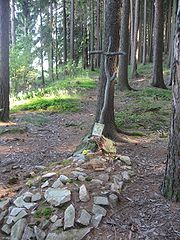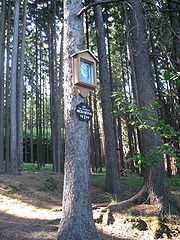
Hilsner Affair
Encyclopedia


Anti-Semitism
Antisemitism is suspicion of, hatred toward, or discrimination against Jews for reasons connected to their Jewish heritage. According to a 2005 U.S...
trials following an accusation of blood libel against Leopold Hilsner, a Jewish inhabitant of the village of Polná
Polná
Polná is a town with around 5,000 inhabitants in the Vysočina Region of the Czech Republic.Founded in the second half of the 12th century, it is first mentioned in a written document in 1242. At that time, there had already been a church in Polná. Originally, Polná was a forest collier settlement,...
in Bohemia
Bohemia
Bohemia is a historical region in central Europe, occupying the western two-thirds of the traditional Czech Lands. It is located in the contemporary Czech Republic with its capital in Prague...
in 1899 and 1900. The affair achieved widespread media publicity at the time.
Anežka Hrůzová, a 19-year old Czech Catholic girl, living in Věžnička
Vežnicka
Věžnička is a village in the Jihlava District, Vysočina Region of the Czech Republic. About 116 people live there and it has 4,51 km². Věžnička was first documented in 1502....
, a village two miles from Polná
Polná
Polná is a town with around 5,000 inhabitants in the Vysočina Region of the Czech Republic.Founded in the second half of the 12th century, it is first mentioned in a written document in 1242. At that time, there had already been a church in Polná. Originally, Polná was a forest collier settlement,...
, and going every day to the city to work as a seamstress, left her place of employment on the afternoon of March 29, 1899, and did not return to her home. Three days later (April 1) her body was found in a forest, her throat having been cut and her garments torn. Nearby was a pool of blood, some blood-stained stones, parts of her garments, and a rope with which she had been either strangled to death or dragged, after the murder, to the place where the body was found.
The suspicion of the sheriff was first turned against four vagrants who had been seen in the neighborhood of the forest on the afternoon of the day when the murder was supposed to have been committed. Among them was Leopold Hilsner, a 23-year old Jew, a man of little intelligence, who had been a vagrant all his life. Suspicion against him was based on the fact that he had been frequently seen strolling in the forest where the body was found. A search of his house showed nothing suspicious. He claimed to have left the place on the afternoon of the murder long before it could have been committed; but he could not establish a perfect alibi. Hilsner was arrested and tried at Kutná Hora
Kutná Hora
Kutná Hora is a city in Bohemia, now the Czech Republic in the Central Bohemian Region.-History:The town began in 1142 with the settlement of the first Cistercian Monastery in Bohemia, Kloster Sedlitz, brought from the Imperial immediate Cistercian Waldsassen Abbey...
September 12–16. He denied all knowledge of the crime. The only object which could be used as evidence against him was a pair of trousers on which some stains were found that, according to the testimony of chemical experts, might have been blood, while the garment was wet as if an attempt had been made to wash it. Witness against him, who claimed to have seen Hilsner, at a distance of 2,000 feet, in company with two strange Jews, on the day on which the murder was supposed to have been committed and on the spot where the body was found. Another witness claimed to have seen him come from that place on the afternoon of March 29 and to have noticed that he was very much agitated. Both the state's attorney and the attorney for the Hrůza family Karel Baxa
Karel Baxa
Karel Baxa was a Czech politician in Austro-Hungarian Monarchy and then in Czechoslovakia. He is most known for his long term position as mayor of Prague .-Advocacy:...
made clear suggestions of ritual murder. Testimony had proved that Hilsner was too weak to have committed the crime by himself. Still he was sentenced to death for participation in the murder, while his supposed accomplices were undiscovered and no attempt was made to bring them to justice.
On the ground of technicalities, an appeal was made by Tomáš Masaryk
Tomáš Masaryk
Tomáš Garrigue Masaryk , sometimes called Thomas Masaryk in English, was an Austro-Hungarian and Czechoslovak politician, sociologist and philosopher, who as an eager advocate of Czechoslovak independence during World War I became the founder and first President of Czechoslovakia, also was...
to the supreme court, which ordered a new trial, to be held at Písek
Písek
Písek is a town in the South Bohemian Region of the Czech Republic. It has a population of 29 909 .-About:Písek is usually called "The Athens of the South", although Athens is much more southerly, because it has many high schools and schools of higher education, e.g. the Film School in Písek...
in order to avoid intimidation of the jury by the mob, and that it might not be influenced by political agitation. On September 20, 1899, a few days after the first trial, Hilsner was frightened by his fellow prisoners, who showed him some carpenters working in the courtyard of the jail and told him that they were constructing a gallows for him. They persuaded him to give the names of his accomplices, as by doing so he would obtain a commutation of his sentence. Hilsner implicated Joshua Erbmann and Solomon Wassermann as those who had assisted him. Being brought before the judge on September 29, he declared that this charge was false. On October 7, however, he reiterated the charge, but again recanted on November 20. Fortunately for those he had accused, they were able to prove perfect alibis, one of them having been in jail on the day of the murder, while the other proved, from certificates of poorhouses in Moravia which he had visited as a beggar, that he could not possibly have been in Polná on that day.
Meantime Hilsner was accused of another murder. Marie Klímová, a servant, had disappeared July 17, 1898, and a female body found October 27 following in the same forest where that of Anežka Hrůzová had been discovered, had, with great probability, been identified as that of the missing girl. Decomposition was, however, so advanced that not even the fact that the girl had been murdered could be established. Hilsner, charged with this crime also, was tried for both murders in Písek (October 25 - November 14, 1900). The witnesses at this trial became more definite in their statements. Those that at the first trial had spoken of a knife which they had seen in Hilsner's possession, now asserted distinctly that it was such a knife as was used in ritual slaughtering. The strange Jews who were supposed to have been seen in company with Hilsner were more and more particularly described. When witnesses were shown that the testimony given by them at the second trial differed from that given at the first trial, they said either that they had been intimidated by the judge or that their statements had not been correctly recorded.
The verdict pronounced Hilsner guilty of having murdered both Anežka Hrůzová and Marie Klímová. He was sentenced to death (Nov. 14, 1900), but the sentence was commuted by the emperor to imprisonment for life. The sentence was commuted to life imprisonment on the basis of an imperial reprieve on 11 June 1901, although a number of requests to renew the trial were turned down. Shortly before the end of the First World War (24 March 1918) Hilsner was pardoned by Karl I of Austria
Karl I of Austria
Charles I of Austria or Charles IV of Hungary was the last ruler of the Austro-Hungarian Empire. He was the last Emperor of Austria, the last King of Hungary, the last King of Bohemia and Croatia and the last King of Galicia and Lodomeria and the last monarch of the House of Habsburg-Lorraine...
. He spent the rest of his life in Velké Meziříčí
Velké Mezirící
Velké Meziříčí is a town in the Vysočina Region, Czech Republic. It is situated under the original Gothic castle in a valley framed by the hills of the Bohemian-Moravian Highlands....
, Prague and Vienna
Vienna
Vienna is the capital and largest city of the Republic of Austria and one of the nine states of Austria. Vienna is Austria's primary city, with a population of about 1.723 million , and is by far the largest city in Austria, as well as its cultural, economic, and political centre...
; he died on 9 January 1928 at the age of 52 in Vienna
Vienna
Vienna is the capital and largest city of the Republic of Austria and one of the nine states of Austria. Vienna is Austria's primary city, with a population of about 1.723 million , and is by far the largest city in Austria, as well as its cultural, economic, and political centre...
. His verdict was never annulled, and no one else was ever charged with the murders.
See also
- Tiszaeszlár AffairTiszaeszlár blood libelThe Tiszaeszlár Affair, was an accusation of ritual murder against Jews in Hungary, which led to a trial that set off anti-semitic agitation in 1882 and 1883.-Origin of the accusation:...
- Beilis Affair
- Dreyfus AffairDreyfus AffairThe Dreyfus affair was a political scandal that divided France in the 1890s and the early 1900s. It involved the conviction for treason in November 1894 of Captain Alfred Dreyfus, a young French artillery officer of Alsatian Jewish descent...
- History of anti-SemitismHistory of anti-SemitismThe history of antisemitism – defined as hostile actions or discrimination against Jews as a religious or ethnic group – goes back many centuries; antisemitism has been called "the longest hatred." Jerome Chanes identifies six stages in the historical development of...

